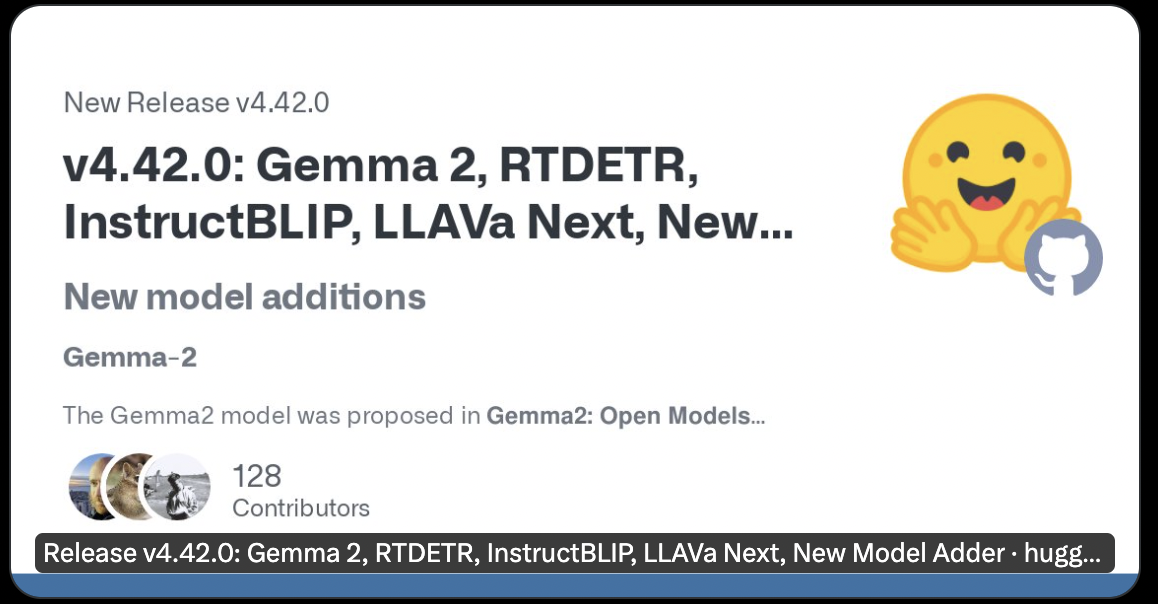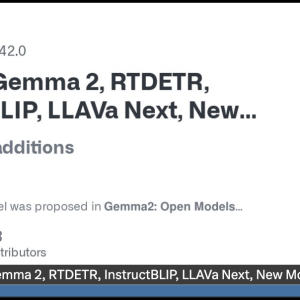

Hugging Face has announced the release of Transformers version 4.42, which brings many new features and enhancements to the popular machine-learning library. This release introduces several advanced models, supports new tools and retrieval-augmented generation (RAG), offers GGUF fine-tuning, and incorporates a quantized KV cache, among other improvements.
With Transformers version 4.42, this release of new models, including Gemma 2, RT-DETR, InstructBlip, and LLaVa-NeXT-Video, also makes it more noteworthy. The Gemma 2 model family, developed by the Gemma2 Team at Google, comprises two versions: 2 billion and 7 billion parameters. These models are trained on 6 trillion tokens and have shown remarkable performance across various academic benchmarks in language understanding, reasoning, and safety. They outperformed similarly sized open models in 11 of 18 text-based tasks, showcasing their robust capabilities and responsible development practices.
RT-DETR, or Real-Time DEtection Transformer, is another significant addition. This model, designed for real-time object detection, leverages the transformer architecture to identify and locate multiple objects within images swiftly and accurately. Its development positions it as a formidable competitor in object detection models.
InstructBlip enhances visual instruction tuning using the BLIP-2 architecture. It feeds text prompts to the Q-Former, allowing for more effective visual-language model interactions. This model promises improved performance in tasks that require visual and textual understanding.
LLaVa-NeXT-Video builds upon the LLaVa-NeXT model by incorporating both video and image datasets. This enhancement enables the model to perform state-of-the-art video understanding tasks, making it a valuable tool for zero-shot video content analysis. The AnyRes technique, which represents high-resolution images as multiple smaller images, is crucial in this model’s ability to generalize from images to video frames effectively.
Tool usage and RAG support have also significantly improved. Hugging Face automatically generates JSON schema descriptions for Python functions, facilitating seamless integration with tool models. A standardized API for tool models ensures compatibility across various implementations, targeting the Nous-Hermes, Command-R, and Mistral/Mixtral model families for imminent support.
Another noteworthy enhancement is GGUF fine-tuning support. This feature allows users to fine-tune models within the Python/Hugging Face ecosystem and then convert them back to GGUF/GGML/llama.cpp libraries. This flexibility ensures that models can be optimized and deployed in diverse environments.
Quantization improvements, including adding a quantized KV cache, further reduce memory requirements for generative models. This update, coupled with a comprehensive overhaul of the quantization documentation, provides users with clearer guidance on selecting the most suitable quantization methods for their needs.
In addition to these major updates, Transformers 4.42 includes several other enhancements. New instance segmentation examples have been added, enabling users to leverage Hugging Face pretrained model weights as backbones for vision models. The release also features bug fixes and optimizations, as well as the removal of deprecated components like the ConversationalPipeline and Conversation object.
In conclusion, Transformers 4.42 represents a significant development for Hugging Face’s machine-learning library. With its new models, enhanced tool support, and numerous optimizations, this release solidifies Hugging Face’s position as a leader in NLP and machine learning.
Sources
- https://github.com/huggingface/transformers/releases/tag/v4.42.0
- https://x.com/osanseviero/status/1806440622007447631
The post Transformers 4.42 by Hugging Face: Unleashing Gemma 2, RT-DETR, InstructBlip, LLaVa-NeXT-Video, Enhanced Tool Usage, RAG Support, GGUF Fine-Tuning, and Quantized KV Cache appeared first on MarkTechPost.